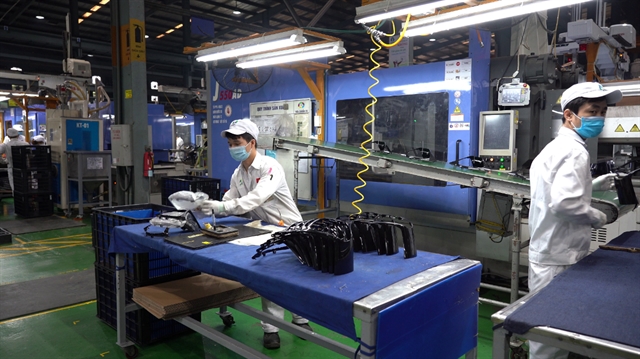 Economy
Economy


|
| Hà Nội Plastics Company. — Photo courtesy of Hà Nội Plastics Company |
HÀ NỘI — Many plastic businesses are pioneering the way and connecting green production, to meet the increasing demands of consumers as well as global market trends.
A report from the Việt Nam Plastics Association shows that the plastic industry has nearly 4,000 businesses nationwide.
Of which, 90 per cent are small and medium-sized enterprises, concentrated mainly in the southern region.
Total revenue of the plastic industry has reached over US$25 billion and exports account for 22 per cent.
The growth rate of Việt Nam's plastic industry has reached double digits of 12-15 per cent per year in the past five years.
Vietnamese plastic enterprises have been producing a full range of plastic products to serve domestic consumption and export markets.
In particular, Vietnamese plastic products have been exported to more than 160 countries around the world and are present in many demanding markets such as the US, Germany, France, the UK, Italy, Netherlands, Spain and Japan.
Việt Nam can now produce all kinds of plastic materials, including PVC, PP, PET, PS and PE, with a total capacity of nearly 3 million tonnes per year.
Some of the key export products of the plastic industry are packaging, sheets, plates, films, products used in transport packaging, household plastic and decorative items.
Hồ Đức Lam, Chairman of the Việt Nam Plastics Association, said that the export turnover of plastic products has grown steadily over the years from $3 billion in 2018 to $5.5 billion last year, with an average growth rate of 12-20 per cent per year.
Domestic raw materials meet 30 per cent of domestic market demand, the remaining 70 per cent is imported from countries and territories around the world.
Lam also shared that along with the changes in the Vietnamese economy, the Vietnamese plastic industry has made continuous progress to more effectively support the business community, especially the green production transformation.
The association will promote a strategy for the development of the Vietnamese plastic industry in the 2023-2030 period, helping businesses have orientations for industry development and methodical investment; and hold diverse domestic and foreign trade promotion programmes, creating a bridge for businesses to integrate into the global market.
Regarding green production, Lê Anh, Sustainability Director of DUYTAN Plastic Recycling Company, pointed out that the current packaging trend revolves around three phrases: moderation, reuse and multi-use.
Using plastic and recycled products would help the circular economy be applied and expanded, he said.
Therefore, the priority solution for packaging development of manufacturers today was to use recycled materials with environmentally friendly designs, he added.
Similarly, in the flow of free trade market integration, circular economy and green production, many units operating in the plastic industry and related industries have identified sustainable development as guiding principle in all business operations.
These units not only focus on investing in building recycling plants, but also actively participate in contributing initiatives related to the "green production path".
On the basis of strengthening investment co-operation and joint ventures, at the same time, becoming suppliers and participating in the supply chain of a number of global brands, including Coca Cola, Nestle, LaVie, Unilever and Suntory Pepsico, has helped many plastic businesses and related industries establish circular economic models.
Some Vietnamese businesses have enhanced their brands and are official members of the Packaging Recycling Organisation Việt Nam (PRO Việt Nam) or Việt Nam Waste Recycling Association (VWRA).
From the perspective of an expert in the field of consumer markets, Vũ Kim Hạnh, President of the Business Association of High Quality Vietnamese Products, assessed that the transformation to standardise production processes and product quality to meet the market's "green" requirements has helped businesses access the green economy, circular economy and sustainable development.
As for consumers, when voting for high-quality Vietnamese goods enterprises, environmental protection is also one of the key factors affecting their decisions.
In order to produce and do business effectively, businesses needed to tighten cost management and should only focus on a few essential and important products following green standards, said Hạnh.
In addition to shifting to green production, businesses needed to accompany the Government and associations to raise awareness about green consumption to receive consumer support from the social community.
Statistics from the Ministry of Natural Resources and Environment show that each year in Việt Nam there is about 1.8 million tonnes of plastic waste, of which more than half is discharged into the sea.
However, after the Vietnamese Government's commitment to "Net-Zero" by 2050 at the 2021 United Nations Climate Change Summit (COP-26) and new generation trade agreements, the topic of sustainable development has attracted more and more attention from businesses and the social community.
Many production and business units have been promoting a circular economy with a closed production cycle, where waste is returned to become raw materials for production, thereby minimising negative impacts to the environment.
On the Vietnamese market, more and more products that use recycled plastic have appeared, having a regenerated life-cycle in production, business and consumption, which is an encouraging sign on plastic waste treatment in particular and green production transformation in the business community in general. — VNS




